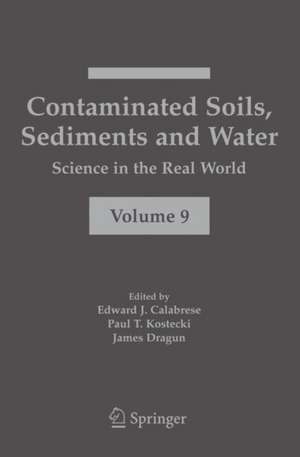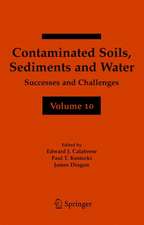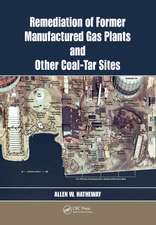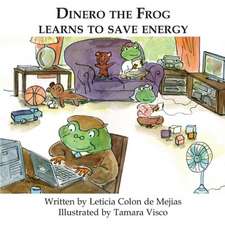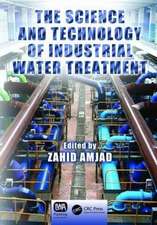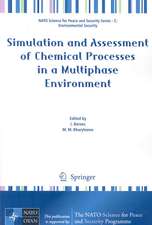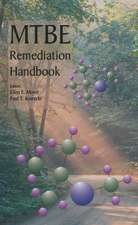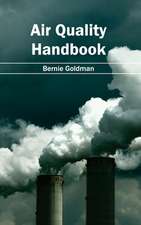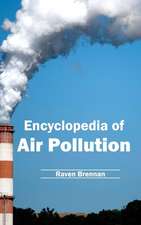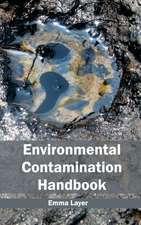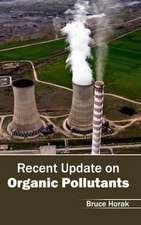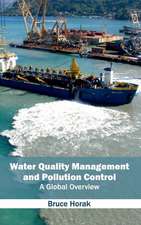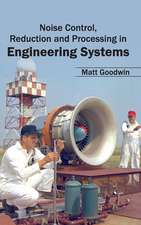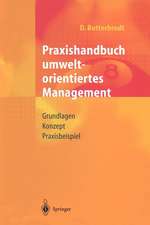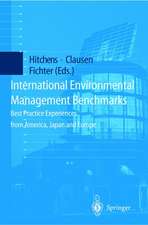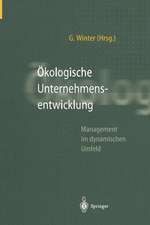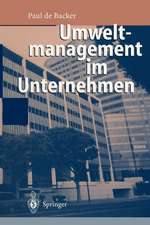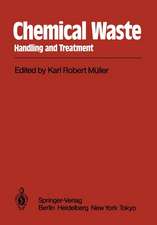Contaminated Soils, Sediments and Water:: Science in the Real World
Editat de Edward J. Calabrese, Paul T. Kostecki, James Dragunen Limba Engleză Hardback – oct 2004
Contributing authors to this volume are from government agencies, academic institutions, the consulting community and industrial companies. This important volume documents the state of environmental science and provides perspective on where we as an industry have come from. Increased scientific, engineering and consulting alliances and collaboration should drive our efforts going forward.
| Toate formatele și edițiile | Preț | Express |
|---|---|---|
| Paperback (1) | 960.78 lei 6-8 săpt. | |
| Springer Us – 29 oct 2010 | 960.78 lei 6-8 săpt. | |
| Hardback (1) | 964.71 lei 6-8 săpt. | |
| Springer Us – oct 2004 | 964.71 lei 6-8 săpt. |
Preț: 964.71 lei
Preț vechi: 1176.47 lei
-18% Nou
Puncte Express: 1447
Preț estimativ în valută:
184.62€ • 200.47$ • 155.08£
184.62€ • 200.47$ • 155.08£
Carte tipărită la comandă
Livrare economică 22 aprilie-06 mai
Preluare comenzi: 021 569.72.76
Specificații
ISBN-13: 9780387230368
ISBN-10: 038723036X
Pagini: 611
Ilustrații: XXV, 611 p. 100 illus.
Dimensiuni: 155 x 235 x 33 mm
Greutate: 1 kg
Ediția:2005
Editura: Springer Us
Colecția Springer
Locul publicării:New York, NY, United States
ISBN-10: 038723036X
Pagini: 611
Ilustrații: XXV, 611 p. 100 illus.
Dimensiuni: 155 x 235 x 33 mm
Greutate: 1 kg
Ediția:2005
Editura: Springer Us
Colecția Springer
Locul publicării:New York, NY, United States
Public țintă
ResearchCuprins
Effect of Bacteria Augmentation on Aromatic and Asphaltenic Fraction Removal in Solid Culture.- Biodegradation of PAHs in Soil by Two Deuteromycete Fungi.- Biodegradation of Diuron and Pyruthiobac-Sodium by White-Rot and Soil Fungi.- Design Challenges for Large Scale Sulfate Reducing Bioreactors.- In-situ Bioremediation of a Chlorinated Solvent Residual Source in Unconsolidated Sediments and Bedrock Using Bioaugmentation.- Bioremediation of a Railroad Diesel Fuel Spill in Palmer, Massachusetts.- Enhanced Reductive Dechlorination - A Broader Perspective.- Comparison of Dinitrotoluene Degradation by a Mixed Culture in Aqueous Batch System.- Substrate Versatility Studies on the Aerobic Degradation of BTX Compounds.- Bioremediation of Perchlorate and Explosives in Groundwater.- Application of In-situ Oxidations (ISCO) at a Site with Multiple Diverse Hydrogeologic Settings.- A Cost-Effective Decision: Accelerated Cleanup Using Permanganate.- Heavy Metal Content of Soils in the Karstic Area of North Hungary.- Mitigation of Acid Mine Drainage and Other Contamination in the Prince William Forest National Park in Northern Virginia.- Sorption, Desorption and Leaching Transport of Heavy Metals in Soils Common to New England.- Sorption of Zinc in Bentonite, Illite and Kaolin Clay Using Column Leaching Tests.- Passive Diffusion Sampling for Metals.- Background Study of Arsenic Concentrations at a Rhode Island Site.- HiPOx Advanced Oxidation of TBA and MTBE in Grounwater.- Enhanced Natural Attenuation of MTBE & Benzene at a Low Permeability Site Using iSOC Technology.- Phytoremediation of Zinc and Lead Contaminated Soils Using Mirabilis Jalapa.- Ligninolytic Enzymes and Phytotoxic Effects Following Growth of Strains of Pleurotus in MSWI Fly Ash Contaminated with PCCD/Fs.- Accumulation of Heavy Metals by Japanese Weeds and Their Seasonal Movement.- Correlation Test Between Indoor Radon and Surficial Gamma Radiation in Northern Virginia.- Reduction of Radon in Municipal Wells in Virginia and Maryland.- An Overview of State Programs to Investigate and Remediate Contaminated Dry Cleaner Sites.- PCBS in the Delaware: A Thirty-One-Year Technical and Legal Odyssey.- Expert Opinions in Environmental Litigation Gatekeeping 10 Years After Daubert.- Evaluation of Two Organoclays, Clinoptilolite, and Hydroxy-Apatite as Sorbents for Heavy Metal Removal from Water.- Ex-situ Treatment of Dense Non-Aqueous Phase Liquids Using Calcium Oxide (Quick Lime).- NAPL Containment Using In Situ Solidification.- Anaerobic Biodegradation and Biotransformation Using Emulsified Edible Oils.- A Review of Fuzzy Set Theoretic Approaches and Their Applications in Environmental Practice.- Risk-Based Management Strategies and Innovative Remedies for Surface Water Protection: A Case Study.- Application of Passive Vapor Diffusion Samplers at England Air Force Base, Louisiana.- Ultra-Fast Field Gas Chromatography for Site Characterization and Field Monitoring.- Geostatistical Modeling and Mapping of Sediment Contaminant Concentrations.- A Passive Diffusion Bag Sampler Demonstration at Multiple US Department of Defense Installations.
Textul de pe ultima copertă
Increasingly in the environmental industry we are reminded how much we are part of the real world. Global economic pressures, geopolitical uncertainty, business ethics, and other world dynamics exert enormous pressure on our academic, industrial, governmental or consulting work venues. Yet, often these pressures have challenged us to produce scientific and engineering solutions that are more focused, cost-effective and readily implemented. The environmental remediation industry in general has responded well. Perhaps the growing alliance movement in business today is a signpost for another important opportunity. Collaborations enable entities to focus on what they do best and rely on others to do the same. Such collaborations build trust and encourage more strategic thinking.
Contaminated Soils Volume 9 contains 38 technical papers, covering a wide range of environmental issues. Volume discussion includes: Part I Bioremediation; Part II Chemical Oxidation; Part III Heavy Metals; Part IV MTBE; Part V Phytoremediation; Part VI Radiation; Part VII Regulatory and Legal issues; Part VIII Remediation; Part IX Risk Based Cleanup; and Part X Site Assessment.
Contributing authors to this volume are from government agencies, academic institutions, the consulting community and industrial companies. This important volume documents the state of environmental science and provides perspective on where we as an industry have come from. Increased scientific, engineering and consulting alliances and collaboration should drive our efforts going forward.
Contaminated Soils Volume 9 contains 38 technical papers, covering a wide range of environmental issues. Volume discussion includes: Part I Bioremediation; Part II Chemical Oxidation; Part III Heavy Metals; Part IV MTBE; Part V Phytoremediation; Part VI Radiation; Part VII Regulatory and Legal issues; Part VIII Remediation; Part IX Risk Based Cleanup; and Part X Site Assessment.
Contributing authors to this volume are from government agencies, academic institutions, the consulting community and industrial companies. This important volume documents the state of environmental science and provides perspective on where we as an industry have come from. Increased scientific, engineering and consulting alliances and collaboration should drive our efforts going forward.
Caracteristici
Cooperation between remediation research and professional industries applying state of the art technology Includes supplementary material: sn.pub/extras
